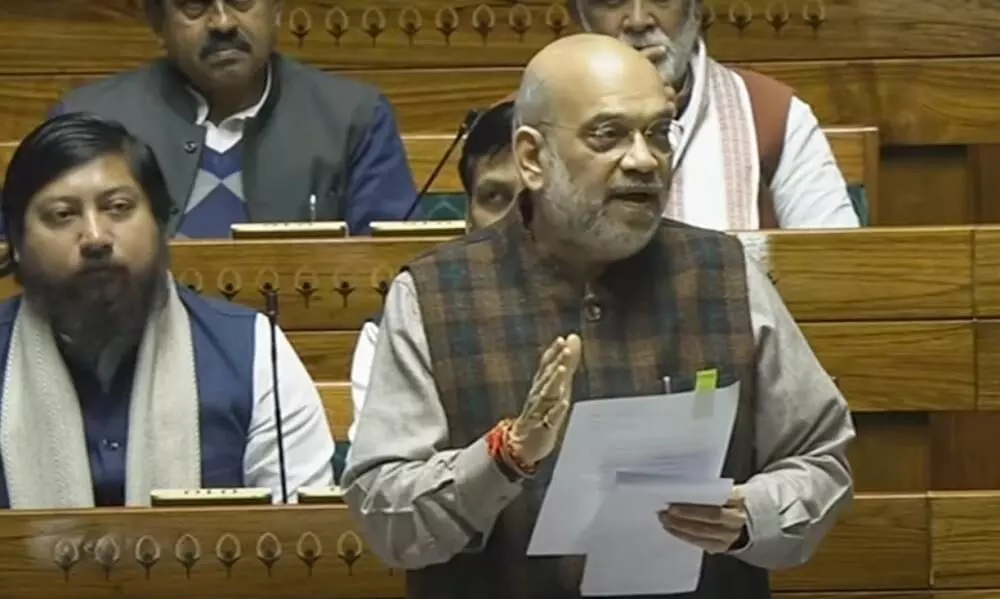
Lok Sabha passes 3 amended criminal law Bills, Telecom Bill
text_fieldsNew Delhi: The Lok Sabha on Wednesday passed three amended criminal bills namely Bharatiya Nyaya (Second) Sanhita, 2023; Bharatiya Nagarik Suraksha (Second) Sanhita, 2023; and Bharatiya Sakshya (Second) (BSB) 2023.
The lower house also passed the Telecommunications Bill, 2023, with a voice vote.
The three Bills were passed after Home Minister Amit Shah spoke in the House and the majority of MPs present in the Lower House voted in favour of the bills by voice vote.
The proceedings took place in the absence of 97 Opposition MPs, who have been suspended over “misconduct” over the last two days. So far 143 opposition MPs have been suspended from the two Houses of Parliament.
Referring to IPC, CrPc, Indian Evidence Act, Shah said: “New criminal law bills will free people from a colonial mindset. The three laws were made during the time of the British. Till the laws are not repealed, the UK laws will continue in the country. Her Majesty, London Gazette, British Crown and barrister terms continue to be used in India because of the laws.”
Shah said that the bills were framed after consultations. He said he had even gone through every comma and full stop before they were tabled in the Lok Sabha.
 Also Read - Govt. withdraws 3 new criminal law Bills; to replace them with changes
Also Read - Govt. withdraws 3 new criminal law Bills; to replace them with changes
He said that the three bills would establish a justice system based on Indian thinking and that the existing laws reflect the colonial mindset of punishing for a crime but not doing justice.
Shah also highlighted the changes brought in the new Bills and said a provision for trial in absentia has been introduced to the criminal justice system.
"A provision for Trial in Absentia has been introduced. Many cases shook us, be it the Mumbai bomb blast or any other. Those people are hiding in other countries and trials are not underway.
"They don't need to come here now. If they don't appear before the court within 90 days then in their absence trial will go on. A public prosecutor will be appointed for their prosecution. They will be hanged. It will make the process to bring them back since it changes their status in the other country when they get prosecuted," he said.
He further said after the bill becomes law, the case would have to be brought to trial in 120 days.
"Now the accused will get seven days to file a plea for acquittal. The judge has to hold the hearing in those seven days and in a maximum time of 120 days, the case would come to trial. There was no time limit for plea bargaining earlier. Now if one accepts their crime within 30 days of the crime then the punishment will be less," he said.
He also said that there was no provision to present documents during trials. "We have made it compulsory to produce all documents within 30 days. No delays will be made in that," he said.
He also underlined that for the poor, the biggest challenge to get justice is the financial challenge.
 Also Read - Mimicry an art, PM did it too: TMC MP after row over aping V-P Dhankar
Also Read - Mimicry an art, PM did it too: TMC MP after row over aping V-P Dhankar
"For years 'tareekh pe tareekh' keep going. Police hold the judicial system responsible. The government holds the police and judiciary responsible. The police and judiciary hold the government responsible for the delay. Now, we have made many things clear in the new laws," he said.
The Bharatiya Nyaya Sanhita will replace the Indian Penal Code 1860, the Bharatiya Nagarik Suraksha Sanhita will replace the CrPC of 1973 and the Bharatiya Sakshya Bill will replace the Indian Evidence Act of 1872.
The new laws also explain "organised crime" for the first time". "There was no special law for this. We have included cybercrimes, economic crimes, land grabbing, arms trade, dacoity and human trafficking," Shah said.
Shah said the new laws are "gender-neutral", “victim-centric" and “justice-centric", rather than “punishment-centric”. He also said that under the new criminal laws, the government has included a provision of death penalty for those committing the crime of mob lynching.
Shah questioned the previous Congress government, "You have also ruled this country for 58 years, so why didn't you include mob-lynching in the laws? You used the word mob-lynching to abuse us (BJP), but then you forgot about it once you came into power."
The Telecommunications Bill seeks to replace the Telegraph Wires (Unlawful Possession) Act, 1950, the Indian Telegraph Act 1885, and the Indian Wireless Telegraphy Act 1933. The bill allows the government temporary control over telecom services, citing national security concerns.
This unprecedented authority could also extend to the suspension of services in the interest of national security,
Meanwhile, the Rajya Sabha passed the Central Goods and Services Tax (Second Amendment) Bill, 2023 on Wednesday.
The Provisional Collection of Taxes Bill, 2023 was also passed on Wednesday. It gives statutory backing to the government to collect taxes from midnight as per the announcement made in the Union Budget.
The bill comes with provisions to refund taxes collected that have not been incorporated in the Finance Bill as per the budget for the fiscal year starting April 1. It repeals The Provisional Collection of Taxes Act, 1931.

























